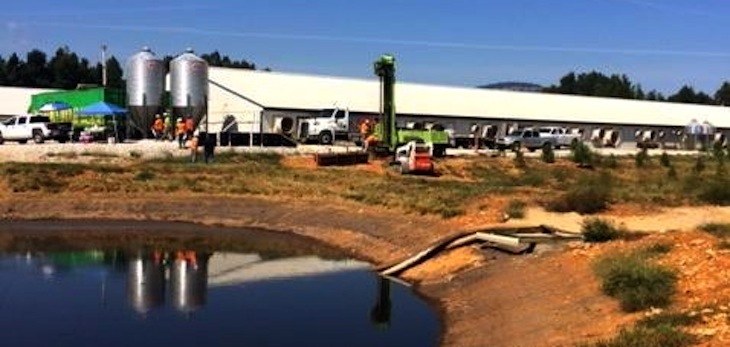Hog farm near Buffalo River receiving $6.2 million to close
by June 13, 2019 6:47 pm 2,481 views

C&H Hog Farms, the controversial facility located 6.6 miles from the Big Creek that flows into the Buffalo National River, will cease operations in return for $6.2 million as part of a voluntary agreement, Gov. Asa Hutchinson announced Thursday (June 13).
In addition, Hutchinson said he was directing that a temporary moratorium on large-scale concentrated animal feeding operations, or CAFOs, in the Buffalo River watershed be made permanent.
Speaking to the Arkansas Municipal League and to reporters afterwards, Hutchinson said the farmers will receive $6.2 million. They will still own the land under a conservation easement that will prohibit the construction of a CAFO there.
Hutchinson said the money will help the farmers pay off a multi-million dollar loan and compensate them for the loss of their business.
Most of the money will come from the state. Hutchinson said between $600,000 and $1 million will come from The Nature Conservancy. That amount will cover a shortfall between what the farmers wanted and what the state was offering. Under the agreement, once an escrow account is funded, C&H will have up to 180 days to fully shut down operations.
Hutchinson said the owners “obtained the permit fairly and have operated the hog farm with the utmost care from the beginning. They have not done anything wrong. But the state should have never granted that permit for a large-scale hog operation in the Buffalo River Watershed.”
Richard and Phillip Campbell and Jason Henson received a permit in 2012 allowing them to raise approximately 6,500 hogs. The Arkansas Department of Environmental Quality rejected the farm’s application for a new operating permit in January 2018 and again in November, citing water-quality issues and inadequate testing. But the owners appealed in circuit court and filed a civil lawsuit.
Opponents fear the farm’s waste is polluting the nation’s first national river.
Hutchinson told reporters that the agreement had been negotiated over the past few days and signed this morning. He said he had decided to settle the case rather than wait for the legal process to unfold because of the expense, length and uncertainty of litigation, which would take years to resolve.
“This step was logical both in terms of saving money in litigation costs, but also resolving it much quicker than litigation could,” he said.
The agreement prohibits using any building on the property for “the feeding, breeding, raising or holding of animals” that is “specifically designed as a confinement area where manure may accumulate.”
However, it authorizes activities such as soil cultivation and free-range livestock excluding swine. The animals can’t be confined or maintained on the property for more than 44 days a year. Only two “animal units” are allowed per acre, with large animals such as cows and horses counting as one unit, medium animals including sheep and goats counting as .5 animal units, and small animals including fowl counting as .1 animal units. Forestry is allowed, as are recreational activities and single family dwellings.
The Buffalo River Watershed Alliance, which has long opposed the hog farm, said in an email sent to supporters, “This closure announcement is what we have all been seeking for 6 long years.” It said it would continue to monitor the closure process and said other threats to the river exist.
